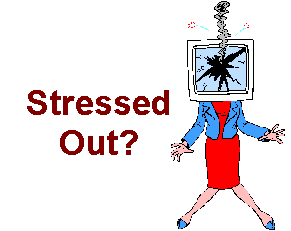|
A recent NIOSH (National Institute for Occupational Safety and Health) publication Stress...At Work reports that 26 percent of U.S. workers--at least one worker out of every four--say they are "often or very often burned out or stressed" by their work. Job stress shouldn't be confused with challenging work. The two are not the same. A challenge can energize and motivate workers. It's an important ingredient for healthy and productive work.
Job stress is a harmful physical and emotional response to excessive job demands or work that doesn't fit with an employee's skills or needs.
Infrequent or short-lived stress poses little risk, but a long-time stressful condition keeps the body tensed and ready for "fight or flight." In turn the pressure increases the wear and tear to the body systems. Eventually everything breaks down.
Early warning signs of stress may include headaches, sleep disturbances, difficulty concentrating, job dissatisfaction and low morale. But sometimes these clues aren't obvious. Studies show that work stress may increase a person's risk for cardiovascular disease, psychological disorders, workplace injury and other health problems.
Some employers argue that stressful working conditions are necessary--that they have to turn up the pressure to make workers productive and profitable. But recent findings show that if working conditions are stressful, absenteeism, tardiness and quits increase. Research also shows that policies benefiting worker health also benefit the company's bottom line.
Unions negotiate many benefits to help members cope with stress. "Wages, insurance, job security, and vacation are all protections included in our contract." Many local union standing committees help members cope with or eliminate stress.
Unions have negotiated stress reducing cushions that many people take for granted. There's medical leave, holidays, grievance procedures, and bidding procedures that allows a person to move from one department to another. Unions have reduced a lot of job stress by negotiating working conditions that eliminate them, but sometimes that isn't enough. Everyone has their own way of dealing with stress.
Don't be too hard on yourself. Try to laugh a little bit about things and take life a day at a time. One member I talked with said that some days if he's really stressed after work, he takes a nap. Other days he plays with his home computer or takes a walk. "I walk away from stress or focus on my family". Another said, "I try to leave it behind me when I leave work." Some people walk out their frustration during lunch break, others read, play sports, pull weeds in the garden, watch children play, golf, ...the list goes on and on.
|
|


